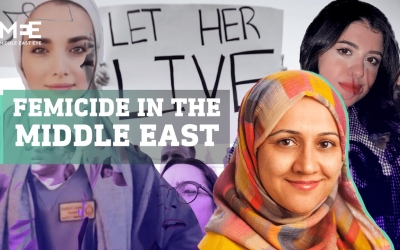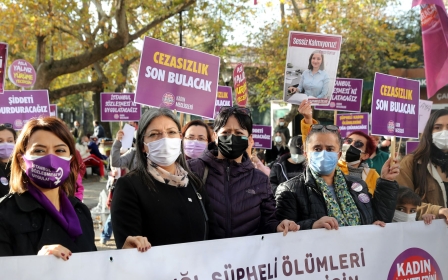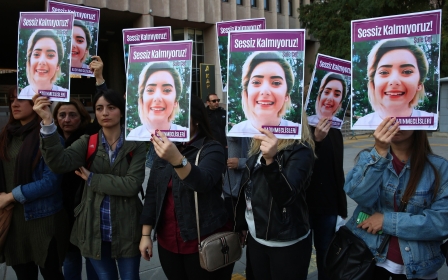'She said no, then got killed': Jordanian women protest against surge in femicides
"Words cannot describe the anger, despair, and sense of injustice that I feel and wake up with every single day since the most recent wave of femicide started," said Diana Ishaqat, 27, who attended a silent sit-in in front of Jordan's parliament on Wednesday to bring attention to the recent increase in murders of women in the country and to commemorate those who have died.
The sit-in followed the stabbing of a woman by her husband outside a courthouse in Karak, south of the capital, Amman, on Monday, less than two weeks after 21-year-old Iman Rashid was fatally shot on her university campus in Amman, and a 20-year-old Jordanian woman was murdered, stabbed 15 times in a parking lot, by her husband in the UAE.
'Any of us could be the next victim, in the public eye, in the middle of the street, in the middle of the day'
- Ghaida Saket, feminist organiser
"Burned, stabbed, drowned, thrown, suffocated, dumped... " read one protester's sign at the sit-in, decrying the various ways women have been murdered in Jordan.
"Once upon a time, a girl said no, then she got killed," another sign read.
The recent slew of femicides - the killing of a woman on account of her gender - has sparked conversation on social media and in the streets and provoked a state of social anxiety regarding these crimes.
"Regular conversations I have with fellow women describe nightmares, a sense of hopelessness, and the search for bag-sized self-defence tools," Ishaqat told MEE, "It's never just one woman, there's always a next... "
Ghaida Saket, 24 and a member of Takatoat, an independent feminist collective based in Jordan that helped to organise the sit-in, said that they received calls from activists across the region to engage in a cross-border silent protest, triggered by recent murders, including one in Egypt.
Saket told MEE that these murders occurred in public spaces, and that the shift from the private to the public space is a "really big red flag".
"What it says is that nobody cares whether anyone sees the crime being committed," she said.
"There is a huge increase in anxiety and a feeling of insecurity and absence of safety among peers and those around us. Any of us could be the next victim, in the public eye, in the middle of the street, in the middle of the day."
Calls for transparent measures
Women's rights activists are demanding that Jordan's parliament enact viable legislation to combat gender-based violence and enforce accountability measures for the perpetrators of crimes against women that are "publicised, transparent and immediate," according to Saket.
Rana Husseini, a veteran crime reporter and women's rights activist in Jordan, also told MEE that the courts had to speak out more. "The court needs to be more vocal when issuing a verdict related to family-based or gender-based violence," she said.
'The court needs to be more vocal when issuing a verdict related to family-based or gender-based violence'
- Rana Husseini, women's rights activist
Husseini noted that it is likely the killing of the Jordanian university student, Rashid, was a "copycat crime," her killer influenced by the stabbing in broad daylight of an Egyptian student, Nayera Ashraf, on 20 June in front of her university in Mansoura, north of Cairo.
This points to the gravity of courts' maintaining transparency on verdicts in femicide cases, Husseini said. "People need to know that if they commit a crime they will be punished."
Husseini also referenced a provision in Jordan's Penal Code, which allows for a family member to waive their legal rights in the event that another family member commits a crime, often resulting in reduced sentences for the perpetrator of a femicide or gender-based violence.
"If someone assaults his daughter and then the brother goes and drops the charges, then who is going to protect this woman? You cannot have people removing charges against each other; where is the protection?"
The provision is often used in cases of "honour crimes," when a woman is killed because the family feels that their female relative has tarnished their reputation by what they loosely term as "immoral behaviour," Husseini writes in her book Years of Struggle: The Women's Movement in Jordan.
There were 13 family murders, with 14 female victims, in Jordan in 2021, according to statistics published by the Sisterhood is Global Institute.
The family member, who often plans the murder alongside another family member, often uses the provision to exonerate the perpetrator by waiving the dead victim's personal claim on her behalf, Husseini writes.
"My name is Nour, my age is 33. I was forced to marry my rapist, and my husband incited my brother to kill me. They gave up my personal right, and the sentence was reduced from the death penalty to seven-and-a-half years," one protester's sign at the sit-in read, referencing a murder case in which the Penal Code provision was used.
Husseini noted that for nearly 15 years many in Jordan have been campaigning for the removal or amendment of this provision, but no change has materialised.
Husseini said that as as an activist she found the recent murders of women "really frustrating," adding that "you feel sometimes life is unfair. Someone can come and just end someone's life like this. It's really, really unfair."
Nightmare 'alive and well'
"Many women who previously had painful experiences [with gender-based violence and abuse] are feeling like the nightmare is alive and well, and anyone could be next," said Ishaqat.
The most recent statistics on domestic and gender-based violence in Jordan, from the 2017-2018 Population and Family Health Survey, confirmed that 25.9 percent of wives between 15 and 49 were subjected to physical, sexual, or emotional violence from their husbands.
Only 19 percent of the women who were physically or sexually abused sought help, and a mere 3 percent submitted complaints to service providers, such as police, doctors or lawyers, according to the survey.
Saket, from the Takatoat collective, said there needed to be a "complete reform to the protection system," with clearer steps for women to follow when they experience threats or abuse and more shelters for victims of domestic violence "where women do not feel detained, but feel protected, and can exercise their freedom and rights".
Jordan's five government-run women's shelters have come under past scrutiny for their "prison-like" treatment and preventing women using them from leaving the premises.
Aya al-Taher, 29 and also a member of Takatoat, told MEE that many of her friends and other members of the collective have expressed their now increasingly tangible fears that threats they have received from men will result in physical harm.
Taher also spoke to the growing sense of a lack of safety in public spaces, particularly universities: "The feelings towards safety and security on university campuses have 100 percent changed.
"What is this new level of violence we have reached?" she asked.
Middle East Eye propose une couverture et une analyse indépendantes et incomparables du Moyen-Orient, de l’Afrique du Nord et d’autres régions du monde. Pour en savoir plus sur la reprise de ce contenu et les frais qui s’appliquent, veuillez remplir ce formulaire [en anglais]. Pour en savoir plus sur MEE, cliquez ici [en anglais].





